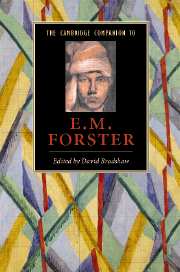Book contents
- Frontmatter
- Introduction
- 1 Forster’s life and life-writing
- 2 Bloomsbury and other values
- 3 Forster and England
- 4 Hellenism and the lure of Italy
- 5 Forster and the short story
- 6 Forster and the novel
- 7 Forsterian sexuality
- 8 Forster and women
- 9 A Room with a View
- 10 Howards End
- 11 Maurice
- 12 A Passage to India
- 13 Forster and modernism
- 14 Forster as literary critic
- 15 Filmed Forster
- 16 Postcolonial Forster
- Further reading
- Index
- Series List
14 - Forster as literary critic
Published online by Cambridge University Press: 28 September 2007
- Frontmatter
- Introduction
- 1 Forster’s life and life-writing
- 2 Bloomsbury and other values
- 3 Forster and England
- 4 Hellenism and the lure of Italy
- 5 Forster and the short story
- 6 Forster and the novel
- 7 Forsterian sexuality
- 8 Forster and women
- 9 A Room with a View
- 10 Howards End
- 11 Maurice
- 12 A Passage to India
- 13 Forster and modernism
- 14 Forster as literary critic
- 15 Filmed Forster
- 16 Postcolonial Forster
- Further reading
- Index
- Series List
Summary
It used to be the case that anyone studying English literature had at least heard of Forster's Aspects of the Novel and its famous distinctions between story and plot, flat and round characters. We can make no such assumptions today when literary study, dominated by theory, disdains such old-fashioned terms. But Forster's short book has much to tell us, not just about the elements of fiction, but also about the nature of criticism which is too often seen, rather simplistically, as a critique not so much of literature, a term it barely recognises, as of the social order. There is no reason why criticism should not look at wider issues but if it takes so little heed of the complexities of art, how can it hope to enlighten us about the much greater complexities of society?
Forster formulates his views about the novel in reaction to Aristotle's Poetics, a conception of history, and a sense of Englishness. In a perhaps typically English, self-deprecating sort of way, he regards the novel as a lower form of art. But that is simply a ruse to boost its status. Aristotle, Forster tells us, was wrong to think that human happiness and misery took the form of action; we must seek for that in the secret life which is the novelist's special territory. Plot, therefore, is not as important to the novel as it is to drama. Forster wants to bracket history out of his discussion of the novel mainly because it tempts us to think in terms of periods, which then prompts us to read novels as mere reflections of their time and so lose what is distinctive about them. In addition, the historian, like the dramatist, is concerned with action which, as we have said, is not the novelist's primary interest.
- Type
- Chapter
- Information
- The Cambridge Companion to E. M. Forster , pp. 223 - 234Publisher: Cambridge University PressPrint publication year: 2007
- 1
- Cited by

